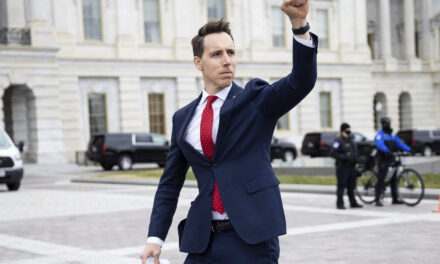Ben Mathis-Lilley of Slate had an appropriate response to the statement the Trump administration released from Education Secretary of Betsy DeVos after their meeting with leaders of Historically Black Colleges and Universities yesterday. But, first, let’s look at the press release:
So, that statement is bonkers.
…this official 2017 federal government press release celebrates legal segregation (!!!) on the grounds that the Jim Crow education system gave black students “more options,” as if there was a robust competition between HBCUs and white universities for their patronage. (When black Mississippian James Meredith chose the “option” of enrolling at the University of Mississippi in 1962, a massive white mob formed on the campus; two people were shot to death and hundreds injured in the ensuing battle/riot, during which federal marshals came under heavy gunfire, requiring the ultimate intervention of 20,000 U.S. soldiers and thousands more National Guardsmen.)
It actually starts out in a defensible way. It’s true that HBCU’s arose because blacks were underserved and did not have equal access to (higher) education. One (sort of) accurate way of putting this is that black leaders saw “that the system wasn’t working” and that they “took it upon themselves to provide the solution.”
After that point, however, DeVos’s statement goes off the rails, catches fire and explodes.
HBCUs didn’t provide more choices. They provided a choice.
In 1862, the Federal government’s Morrill Act provided for land grant colleges in each state. Some educational institutions in the North or West were open to blacks before the Civil War. But 17 states, mostly in the South, had segregated systems and generally excluded black students from their land grant colleges. In response, Congress passed the second Morrill Act of 1890, also known as the Agricultural College Act of 1890, requiring states to establish a separate land grant college for blacks if blacks were being excluded from the existing land grant college. Many of the HBCUs were founded by states to satisfy the Second Morrill Act. These land grant schools continue to receive annual federal funding for their research, extension and outreach activities.
As you can see, it took more than “taking it upon themselves” to get HBCUs up and rolling. It took hard work from organizers and the allies in Congress they created. But that’s just a quibble. The real sin is in suggesting that HBCUs somehow justify DeVos’s educational ideology on school choice, school voucher programs, and charter schools. The HBCUs are not “pioneers of school choice” unless you mean a great student could choose between Howard and Morehouse.
But, look on the bright side, at least she didn’t say, as Georgia Gov. Nathan Deal did last November, “The irony of some of the groups who are opposing doing something to help these minority children is beyond my logic. If you want to advance the state of colored people, start with their children.”
Of course, Deal meant that you could help children by passing an amendment to the state Constitution that would allow for-profit charter schools to take over for failing public ones.
As you might expect, the NAACP opposed it. On Election Day, so did the voters.






